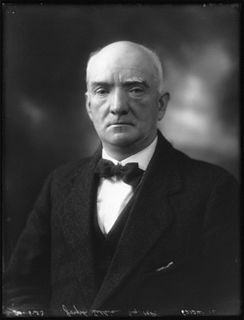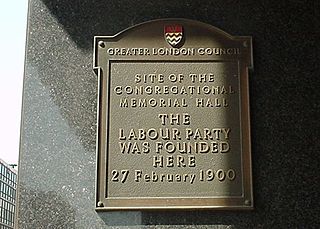Related Research Articles

James Keir Hardie was a Scottish trade unionist and politician. He was a founder of the Labour Party, and served as its first parliamentary leader from 1906 to 1908.
The National Democratic League was a cross-party political organisation in the United Kingdom, which aimed to unite Liberal Party and former Independent Labour Party (ILP) members in a campaign for basic democratic reforms.

Robert Smillie was a Scottish trade unionist and Labour Party politician. He was a leader of the coal miners, and played a central role in moving support from the miners away from the Liberal Party to the Labour Party. He had a firm commitment to socialism as an ideal, and militancy as a tactic.

Joseph Sullivan was a Scottish Labour Party politician who served as a Member of Parliament (MP) from 1922 to 1924, and from 1926 to 1931.
The Cockermouth by-election, 1906 was a by-election held on 3 August 1906 for the British House of Commons constituency of Cockermouth.
The Mid Lanarkshire by-election, 1888 was a parliamentary by-election held on 27 April 1888 for the House of Commons constituency of Mid Lanarkshire in Scotland.
The National Union of General Workers (NUGW) was an early general union in the United Kingdom, the most important general union of its era.

James Mawdsley was an English trade unionist. Alongside Winston Churchill, he stood as a Conservative Party candidate in the double Oldham by-election of 1899. He was born in Preston, Lancashire, to cotton spinner James Mawdsley and his wife, Jane.
Robert Chisholm Robertson was a Scottish political activist.
A by-election was held for the British House of Commons constituency of Sheffield Attercliffe on 4 May 1909.
The Organisation of Scottish Labour is a body established under the national rules of the UK Labour Party.
The South Lanarkshire by-election was a Parliamentary by-election. It returned one Member of Parliament (MP) to the House of Commons, elected by the first past the post voting system.
The North East Lanarkshire by-election was a Parliamentary by-election. It returned one Member of Parliament (MP) to the House of Commons of the United Kingdom, elected by the first past the post voting system.
The United Textile Factory Workers' Association (UTFWA) was a trade union federation in Great Britain. It was active from 1889 until 1975.

The Labour Representation Committee (LRC) was a pressure group founded in 1900 as an alliance of socialist organisations and trade unions, aimed at increasing representation for labour interests in the Parliament of the United Kingdom. The Labour Party traces its origin to the LRC's foundation.
This article lists the Labour Representation Committee's election results in UK parliamentary elections. The Labour Representation was the forerunner of the Labour Party. It was founded in 1900 and became the Labour Party in 1906, shortly after that year's general election.
William Small was a Scottish trade unionist.
This article is about the sponsorship of British Members of Parliament by mining trade unions.
Leeds Trades Council is an organisation bringing together trade unionists in Leeds, in northern England.
Trade union sponsorship of UK Members of Parliament was a phenomenon whereby a union supported a member of the House of Commons with financial contributions.
References
- 1 2 Frank Bealey and Henry Pelling, Labour and Politics, 1900-1906, p.296
- ↑ Knox, William (1987). James Maxton. Manchester: Manchester University Press. p. 7. ISBN 0719021529.
- 1 2 3 Frank Bealey and Henry Pelling, Labour and Politics 1900-1906, p.296